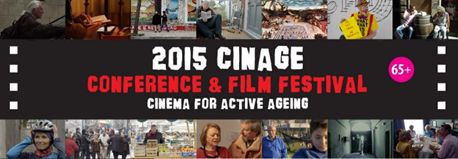European Cinema for Active Ageing (CINAGE)

Aim
Active ageing is considered as the best political vision of old age. Nevertheless, there are still many stereotypes about old age and older people that belong to the past and are not in tune with today’s social changes. Older people are therefore most often portrayed in European films as being frail, in need of help. This is true for some of them, but the majority are quite independent and ready to contribute to social and economic development. It is time that active ageing competencies were portrayed in films where old age is not dealt with only through the glasses of frailty or in a funny way. But what about reality? Moreover, using featured film for expressing themselves helps older people to step out in society, into public places and make the audience understand their consideration of old age.Full Description
CINAGE allowed a new approach to active ageing through audio-visual tools and media. At the same time, using Europeans films, CINAGE promoted a specific review of European Cinema, contributing to a reflection of EU cultures in the field of ageing. Using this new pedagogical approach to Cinema, CINAGE provided audio-visual techniques learning new ICT skills and team work towards a better active ageing. It also empowered older learners to use European films to reflect on their own personal experiences. Endorsing the use of ICT and audio-visual techniques (lighting, recording, sound) CINAGE promoted new pedagogies and practices for LLL and Cultural life. We expected to improve cultural literacy and language and visual literacy skills. New ICT skills approached the language of the ageing population to the language of the new generations, increasing the dialog and interchanging of experiences between them. As providing competencies for active ageing, CINAGE offered a review of the cinematic gerontology, and its essential reading for adult educators. The demand for innovative learning solutions within a lifelong learning approach is part of the core business of all project partners.
Project partners:
- Slovenian Third Age University, Slovenia
- AidLearn, Portugal
- Leeds Beckett University, United Kingdom
- Centro Studi Città di Foligno, Italy
Step by Step Explanation
-
1
The partnership produced a Declaration on the importance of the project.
-
2
Each partner searched for featured European films on active ageing (5 countries per country) and related competencies (learning, civic, health, technological, emotional competencies). A catalogue was created.
-
3
Real stories on old age and active aging were collected showing numerous personal ways of ageing actively. Lifelong approach to active ageing was described.
-
4
In each partner country a focus group screening the films from the catalogue was set up.
-
5
A manual with 6 modules was written.
-
6
A Guide for adult educators was written as well.
-
7
A 120 hour lasting course with film workshops was set up in each country. Short films were studied. Storyboards were written. 12 films were produced from the scratch up to the post production. Trailers were produced.
-
8
National multiplying events were set up. A final conference + festival were in Leeds. They were open to the general and professional audiences, here was huge dissemination work done in all countries.
Results
Implemented Methods
Research into the state of art of old age in partners’ countries
National reports were produced. Inductive research method. Study of literature. Case studies. An European compiled report on active ageing was produced based on the method of comparison.
Focus groups on the value of European films about old age and active ageing
The groups were composed of adult educators, adult education specialists, film specialists, older students, journalists. Discussion led to valuable results like: “Active ageing is individual and requires lifelong approach. Advertisement on active ageing could be produced. Older people who were not born into visual society appreciate the use of film and understanding the film language.”
Making short featured films
The participants learnt how to write storyboards, how to develop psychological profiles of the main characters, how to use camera on location, how to manage shooting of the film, how to edit it and how to deal with post production and music. They also learnt how to make the trailers.



